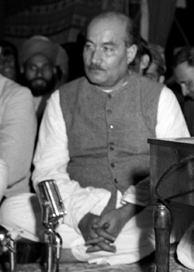Related Research Articles
Ahl-i-Hadith or Ahl-e-Hadith is a Salafi reform movement that emerged in North India in the mid-nineteenth century from the teachings of Sayyid Ahmad Shahid, Syed Nazeer Husain and Nawab Siddiq Hasan Khan. It is an offshoot of the 19th-century Indian Tariqah-i-Muhammadiya movement tied to the 18th-century traditions of Shah Waliullah Dehlawi and the Wahhabi movement. The adherents of the movement described themselves variously as "Muwahideen" and as "Ahl e-Hadith."
The Sultan ul Madaris Urdu: سُلطان المدارس; is a Shia Islamic Madrasa for higher religious education in Lucknow, India. Major course of studies include Jurisprudence, Theology and Islamic Literature.

Josh Malihabadi popularly known as Shayar-e-Inqalab was one of the finest Urdu poets of the era of British India. Known for his liberal values and challenging the established order, he wrote over 100,000 couplets and more than 1,000 rubaiyat in his lifetime. His wrote Yaadon ki Barat, his autobiography which is noted for its frank and candid style. The first Prime Minister of India, Jawaharlal Nehru held him in high esteem and frequently attended the mushaira at Lala Kishan Lal Kalra's United Coffee House where Josh performed.

The Pakistan Institute of Development Economics is a post-graduate research institute and a public policy think tank located in the vicinity of Islamabad, Pakistan.
The Aligarh Movement was the push to establish a modern system of Western-style scientific education for the Muslim population of British India, during the later decades of the 19th century. The movement's name derives from the fact that its core and origins lay in the city of Aligarh in Central India and, in particular, with the foundation of the Muhammadan Anglo-Oriental College in 1875. The founder of the oriental college, and the other educational institutions that developed from it, was Sir Syed Ahmed Khan. He became the leading light of the wider Aligarh Movement.
Chowdhury is a title of honour, usually hereditary, originating from the Indian subcontinent. It is an adaption from Sanskrit. During the Mughal rule, it was a title awarded to eminent people, while during British rule, the term was associated with zamindars and social leaders. The common female equivalent was Chowdhurani. Many landlords under the Permanent Settlement carried this surname. Land reforms after the partition of India abolished the permanent settlement. In modern times, the term is a common South Asian surname for both males and females.
Rodney James Alexander Wilson is a British economist and Emeritus Professor of Economics at Durham University. He is known for his expertise on Islamic economics. He is a recipient of Islamic Development Bank Prize in Islamic Banking and Finance.
Shia College is a college located in old Lucknow, Uttar Pradesh, India. It is affiliated with the University of Lucknow and one of the institutes of higher education in India.
References
- ↑ Profile of Syed Nawab Haider Naqvi on Rekhta.org Retrieved 9 September 2020
- 1 2 3 4 5 Profile of Syed Nawab Haider Naqvi on SAGE Publishing website Retrieved 9 September 2020
- ↑ "Evolution of Development Policy: A Reinterpretation (Syed Nawab Haider Naqvi)". Oxford University Press.
- 1 2 3 4 5 Books by Syed Nawab Haider Naqvi on Internet Archive Open Library website Retrieved 9 September 2020
- 1 2 3 4 Syed Nawab Haider Naqvi books on goodreads.com website Retrieved 9 September 2020
- ↑ Syed Nawab Haider Naqvi book review on Princeton University Library website Retrieved 9 September 2020